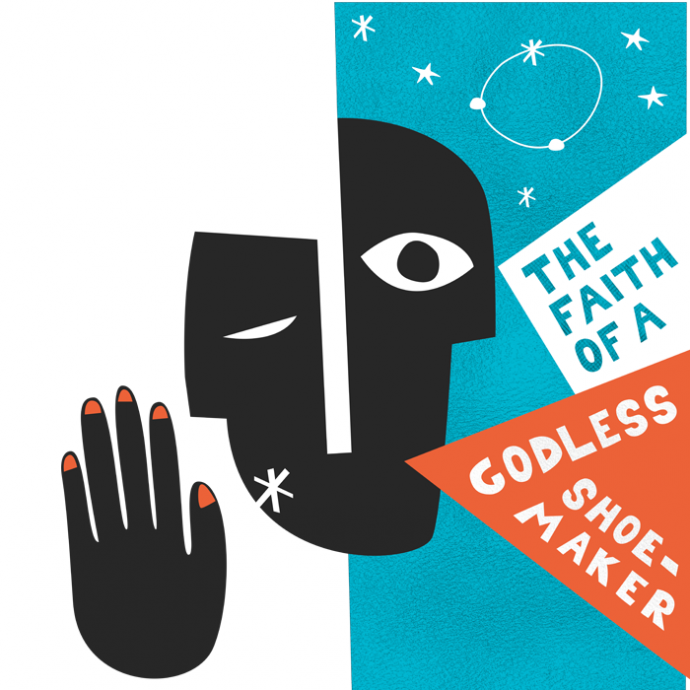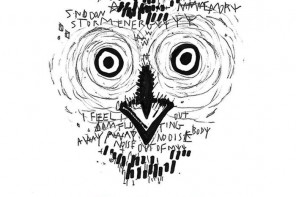Ever been to a Christians-only tailor? Or a Muslim bikini parlor? Well in Berlin there’s an Atheist shoe shop. Sensa Nostra interviews David Bonney on how he got started and (for God’s sake!) how he came up with the idea. So sit down, relax and feel free to unknot your religiously laced shoes.
I’m pretty sure I’ve always been an atheist even before I was aware of what it meant. I grew up in Ireland where religion is a sensitive subject, but my family is non-religious, so it was never a big debate inside our house. My parents wanted me to become a doctor and I wanted to write musicals. Eventually I chose Psychology, as it was somewhere in the middle, but when my academic years came to an end I joined London’s vibrant advertising industry. It was enjoyable, but after six years I got bored working with staid, superficial brands and I was ready for a new challenge. I had the urge to create something purposeful, meaningful, something founded on deep values that people actually gave a shit about.
Later I moved to Berlin and for a while I returned to the world of music, becoming a comic songwriter. At the same time, a friend of mine, a shoemaker, introduced me to the craft and I really enjoyed messing around in her studio. I’d always wanted to design a perfect shoe and this opportunity came along at the same time I wanted to create my own values-based brand. Somehow, the idea of atheism and shoes came together in the shape of an ‘atheist shoe’. It felt like a bizarre and perverse joke. It was such a silly idea that I had to do it. So I told all my friends I was starting an atheist shoe shop, as I knew they’d keep asking about it. I guess I tricked myself into doing it.
Once I’d made my first pair of shoes, a friend told me about Reddit and how many atheists were there. I thought there’s nothing less fun than hanging out with a load of militant atheists online. But he said, “Call yourself a ‘godless shoemaker’— it will get lots of hits”. So we made a post, went for a curry and didn’t think about it again until I started receiving hundreds of emails. It was amazing. We made the front page with just a picture of me holding an atheist shoe. It was clear there was a great appetite. Within a few months we’d launched a Kickstarter campaign and got successfully funded. That process helped us understand exactly what people wanted in the shoe and how much they were willing to pay.
The positive reactions were overwhelming, but I felt a bit of ‘imposter syndrome’. All of a sudden I was talking to a very active online community of atheists, bringing them a godless shoe, without being part of their codes or lingo. Here I was, this laissez-faire, European atheist with a Monty Python-ish idea, confronted by hundreds of outspoken voices. I knew there were some atheists online, but I hadn’t realised how active and powerful they’d be. In some sense it felt like homecoming, in other ways it wasn’t atheism as I had ever experienced it before. There were clearly many people angry about religion!
Soon enough we were shipping all over the world, including to Israel, Iran and Saudi Arabia. There were some atheists who reacted negatively. They responded by saying, “Why are you commercialising my beliefs?” That’s pure nonsense to me. We don’t commercialise beliefs; we commercialise nothingness.
People from religiously suppressed areas, from Alabama to Pakistan, gave us a lots of praise for what we were doing. They’re passionate and proud to wear atheist shoes, and they consider us courageous. But for me it’s just the easiest thing in the world to start an atheist shoe-shop in Berlin. For some its a statement; for others its fashion or art. For me it was silliness. Why do I put “Ich bin atheist” on my shoe soles? Its almost embarrassing, to draw attention to yourself in that way. But I came to see what a powerful and liberating experience it was for others.
In our early days we received an email from a seventeen-year-old American boy thanking us for making the shoes. He said he used a conversation about the shoes to out himself to his evangelical Christian parents. They cried together and eventually his mother said she loved him for who he was and bought him a pair of atheist shoes as a birthday gift. That was the seachange moment for me. From afar it all seems a bit unbelievable and melodramatic, but when we realised some atheists were writing to us from areas where they would get their throats squeezed for not being religious, it was hard not to feel for them.
So our little joke gained great significance and I found myself thinking more about my own atheism. Receiving such a welcoming feeling from the active online community, people all over the world emailing us saying what a great idea the shoes were, the whole experience. It made me feel more responsible to be open about my atheism. I’m hardly militant, though it might appear so; I’m just increasingly aware. And I have to say atheists should be more conscious and outspoken about their non-belief. A lot of people don’t really know what atheism means, but on the other hand it doesn’t really need a definition. Not believing in gods is about as clear as you can get. Maybe the personification can do with redefinition. There’s a risk of atheists seeming nerdy, scientific, unimpressed and boring. But that’s not the reality. Atheists are just like any other person, trying to mind their own business.
I always enjoy having pop-up stores. It’s entertaining listening to people’s responses walking by. People laugh and take photos; slightly older people will verbally express their disdain. In New York we had crazy rabbis come in and tell us we weren’t atheists because we believe in money. Generally most religious people keep their opinions to themselves—probably due to years of mental training—or they stay religious because granny promises to leave them money. The most violent reactions we got were from vegans. They criticised us for using leather in our shoes. Most of them were polite and lovely, but many weren’t. Still, for the sake of the polite ones we’ve created non-leather atheist shoes.
Sometimes I do think I’d like to see the demise of religion. We’d be better of without it, but it has a big grip on society. Atheists should be more vocal and organised to defend their secular rights. The fight for safely having your own beliefs, or non-beliefs, is as vital as ever in our time. The number of atheists is climbing, but paradoxically so is the number of religious fundamentalists. This overarching message is hard to square by just running a witty fashion label, but I’m optimistic that people are becoming more educated, independently minded and conscious enough to call out the preposterous notions of religion and faith. I’m pretty sure fifty years from now, at least in the Western world, that faith will have been put in its place, and it will be about as important as Santa Claus or Harry Potter.







